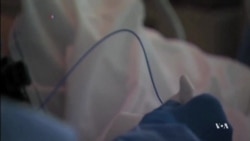According to the World Cancer Research Fund and the American Institute for Cancer Research, colorectal cancer is the third most common cancer worldwide and the fourth most common cause of death for both men and women. Survivability rises if it is diagnosed early enough. A new type of test promises to replace the dreaded colonoscopy as the most reliable method for doing that.
Doctors say the most reliable test for colon cancer is a colonoscopy - looking inside the patient’s large intestine. With a special instrument, they can look for potentially deadly polyps and remove them on the spot.
But University of Miami oncologist Ike Akunyili said the procedure is not a popular one. “You have to put something through somebody's behind and lot of people don't like it.”
That is why many patients opt for the less invasive fecal occult blood test, which can be done at home, but is less reliable. It cannot detect polyps and even misses some cancers.
But a new way to test stool samples, called Cologuard, claims to be 94 percent accurate in identifying colorectal cancer.
Akunyili said this is especially good news for patients who avoid colonoscopies.
“It might increase uptake and make more people who are hesitant about getting screened, get screened,” he said.
Patients can collect a stool sample at home and send it to a laboratory, where it is screened for three genetic markers associated with polyps or early stage tumors.
Mayo Clinic gastroenterologist David Alquist said the new test may lead to fewer colorectal cancer cases, just as the PAP Smear test lowered the number of cervical cancer cases.
“There is no reason why application of Cologuard broadly through our population couldn't achieve the same thing for colon cancer. Our goal is to eradicate colon cancer,” said Alquist.
As screening for genetic markers becomes more sophisticated, doctors say the test soon may be able to identify other gastrointestinal cancers.





